The Food Babe Plagiarism Allegations
 Vani Hari, better known as Food Babe, is a blogger and an activist that focuses on criticism of the food industry, in particular genetically modified foods and the use of certain chemicals and additives foods.
Vani Hari, better known as Food Babe, is a blogger and an activist that focuses on criticism of the food industry, in particular genetically modified foods and the use of certain chemicals and additives foods.
She’s had several key successes as well, including getting Kraft to change the way it colors its macaroni and cheese (after getting over 270,000 people to sign a petition requesting it), getting some beer companies to release their ingredient lists and prompting Subway to drop a common additive in its breads.
However, she’s also been the source of a great deal of controversy, especially as she has grown in popularity. A recent article on NPR highlights many of the common criticisms of her work, including allegations of poor science, her corporate ties and general accusations of being a “fearmonger”.
But even as the arguments continue about the science, one of Hari’s critics, Bobby Cole, has taken a different approach and highlighted examples of what he sees as plagiarism in Hari’s work.
So I decided to take a look at the allegations and see what, if anything, there is to them. While I only looked at the facts Cole presented, there is more than enough to stay that, if nothing else, some mistakes were made.
Analyzing the Analysis
Cole’s analysis focuses on five different stories Hari published, mostly in 2013 with one in 2012. According to him, each story contained passages that were lifted verbatim from other sources without proper citation.
The passages ranged in length from single sentences to whole paragraphs, but the actual amount of copying is not as significant as the graphics may indicate.
In one example, Cole claims that a blog post by Hari about Cellulose, contained ten bullet points, four of which were lifted from an About.com article.
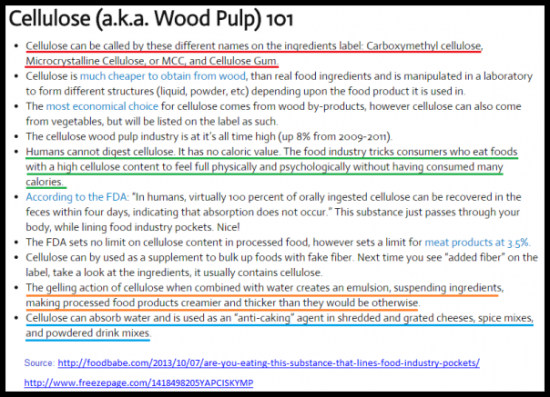
However, when one looks at the exact text underlined, it’s clear that, while Hari and the About.com article make the same points and there is some text overlapping, it’s not a case of verbatim plagiarism.
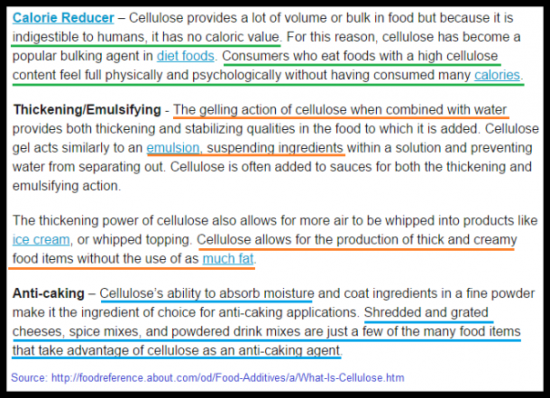
While it’s likely that the About.com article was used as a source, there’s no way to know for certain as none of the bullet points involved are cited in any way.
Other examples, however, are more worrisome. For example one of Hari’s articles about Tea and pesticides contained approximately two paragraphs worth of text from an article on Mother Nature Network with only minor rewrites, mostly for grammar.
Food Babe:
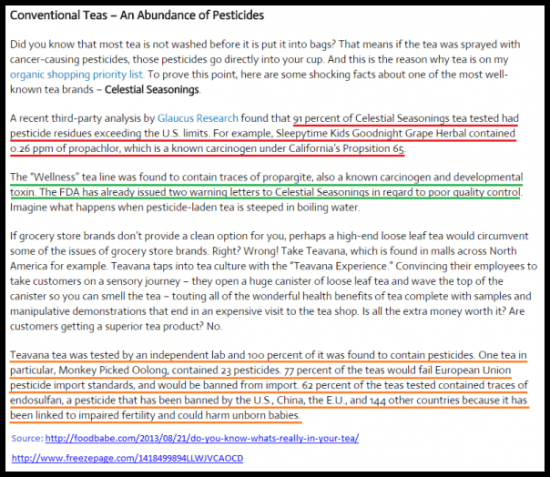
Mother Nature Network:
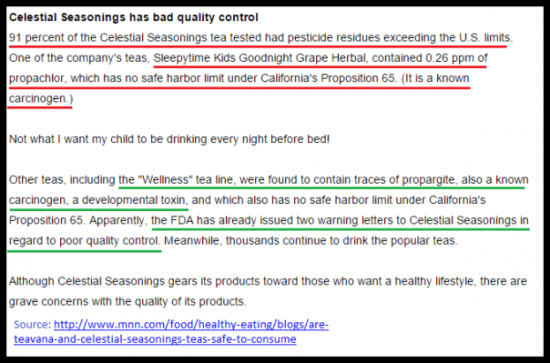
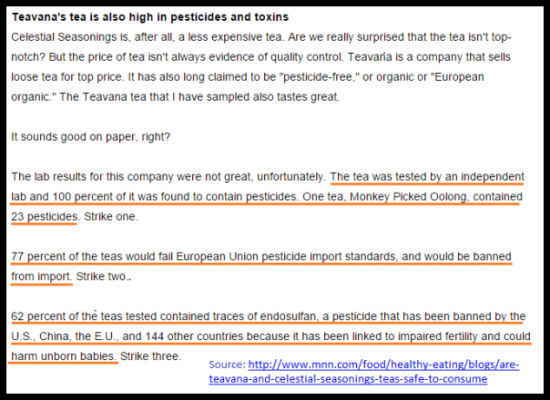
While Hari did cite the original study that the Mother Nature Network article was based upon, there was no citation to the Mother Nature Network article or any indication that much of the text was quoted.
So where does this leave us in terms of the allegations? The answer is, unfortunately, very complex and nuanced. However, as anyone reading this site knows, that’s very common when dealing with plagiarism issues.
No Simple Answers
Did Hari plagiarize? In a couple of the examples, it’s pretty clear that Hari used more verbatim language than I would feel comfortable with. She should have either quoted and cited the original source or, even better, paraphrased more effectively and offered a link to the article that she was pulling from.
The other allegations are weaker and, while it’s likely she used the articles Cole points to as a source, we really can’t know, largely because Hari doesn’t cite any sources for those passages.
However, that quickly slides into a conversation about what kind of citation is needed when blogging. I don’t cite every paragraph for every blog post, especially the ones that are my opinion, and I don’t even site every fact, especially if I’m pulling multiple facts from the same source, as with this article.
So, in the end, we have a few passages in a couple of posts that definitely should have been better cited, that hardly makes her a rampant plagiarist, especially when you consider the volume work she has published.
If I were presented this information about a prolific journalist, I would encourage a thorough review and corrections, but would withhold judgment on further actions. Fareed Zakaria, for example, was suspended pending an investigation over similar allegations but quickly returned to work.
That, to me, would be an appropriate response in this case, especially as Hari, according to the NPR story, is publishing her first book and looking at possible TV deal. That will be difficult though considering Hari is her own editor and there really isn’t anyone above her to do the investigation.
However, as with many plagiarism allegations, the accusations are actually the least interesting part of the story.
Plagiarism Allegations as an Attack
What I find most interesting about the allegations is the environment with which it took place. Hari has been a divisive figure to say the least. She not only has a legion of very ardent followers, but also a legion of strong detractors.
Given the volume of text being written and the animosity on both sides, allegations of plagiarism were virtually inevitable. This doesn’t mean that the allegations are true or untrue, but that they were almost a certainty regardless of veracity.
The reason is simple. When looking to discredit someone, whether they are a politician, a blogger or any other public figure, plagiarism is a low-hanging fruit.
After all, plagiarism checks are very easy to do and anyone, having written enough text, will have at least a few suspicious passages. But while a serious plagiarism issue is certainly a reason to dismiss the work and research of someone, there’s a wide gray area between “completely original” and “completely plagiarized” that requires a more nuanced approach.
However, that nuance is quickly lost when plagiarism is used to attack someone. The plagiarism either must be a huge scandal or it must be a non-issue, there’s no ability to discuss it as something in between.
Unfortunately, most plagiarism allegations these days are adversarial. They aren’t about people looking for truth, but about people looking to tear down one person or one argument.
While the source of the allegations don’t necessarily mean they aren’t true, at least in part, it does make a reasoned discussion nearly impossible. That, in turn, is why I’ve hesitated about writing this article but still felt it important to do so.
Bottom Line
Did Food Babe plagiarize? I would say that at least some of the passages cross the line of appropriate reuse. But before branding Hari with the scarlet “P”, further investigation is necessary to find out if it was a few errant passages or a larger problem.
What I’m going to be most interested in is the response to this article and how all sides react to what I’ve had to say (if they react at all).
If we’re going to be serious about addressing the issue of plagiarism, there must be room for nuanced discussion. But, if we’re just looking to extol or destroy someone, then plagiarism is just another vague attack with little meaning behind.
However, the last thing I want is plagiarism to be used as just another attack. The issue, to me, is simply too serious to be used as just another weapon against people we don’t like.
That being said, there are plenty of plagiarists and plenty of times where it is appropriate to call someone a plagiarist but I don’t think we’re at that point yet with Hari.
To be clear, it’s entirely possible Hari is a raging plagiarist akin to Jayson Blair or Jonah Lehrer. However, the evidence currently doesn’t support that to me. That could change with further evidence.
So rather than an attack against Hari, what I hope does emerge from this story is a dialog about attribution in blogging, in particular science blogging, and how everyone who writes online, myself included, can do it better.
It’s a dialog worth having, but one that has been all-too-rare on the web.
Update
Shortly after publicaiton I received a reply to my email from Hari. I’ve pasted the reply in its entirety below.
I’ve responded to the ridiculous and often deliberately hateful critics (a minority group that this writer publicly belongs to) on my site here: https://foodbabe.com/2014/12/06/food-babe-critics/. It’s interesting that NPR (the article you mention on your site) did not interview anyone in favor of removing certain food additives or that advocates for more transparency in the food system – rather they just interviewed the usual suspects that are critical of my work.
My posts on Foodbabe.com amount to literally millions of words and most of my investigative blog posts are often well over three and four thousand words with dozens of sources and links.
I take these accusations very seriously and just to confirm all of my writings were properly credited, I re-read these posts to make sure everything is backed up by sources and updated any inconsistencies immediately. I originally started this blog as a hobby — but since then, now that it has grown into a public forum, we have enacted strict standards for sourcing in all new investigations. Also, I am having my lead researcher go through all old blog posts like these to make sure everything is appropriately accredited and there are no misinterpretations. In fact, my book that I just recently wrote includes all source material in the index and has been fact checked by multiple sources.
I’m afraid you may have just been another reporter targeted by this incredibly motivated and aggressive group in their targeting of me as a female activist who “dared” to question the unchallenged use of chemicals and additives in our food.
Note: Graphics of highlighted text used with the permission of Bobby Cole.
Want to Reuse or Republish this Content?
If you want to feature this article in your site, classroom or elsewhere, just let us know! We usually grant permission within 24 hours.
